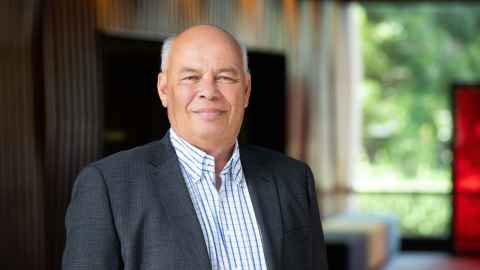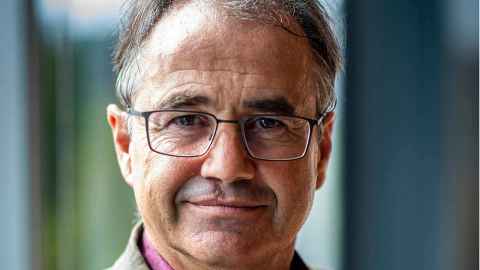Cook Islands research community showcases Indigenous leadership
26 November 2025
Collaboration aims to strengthen research capacity across the Cook Islands and Pacific region.

The Cook Islands research community met online for a landmark webinar 'Research in the Cook Islands: A Review of the Fundamentals' exploring health research evolution, Indigenous methodologies and data governance.
The online event was hosted in collaboration with Te Poutoko Ora a Kiwa – Centre of Pacific and Global Health, alongside Te Marae Ora (Cook Islands Ministry of Health), Te Puna Vai Mārama (Cook Islands Centre for Research) and Te Vairanga Kite Pakari (Cook Islands Research Association) on 25 November.
The session, facilitated by Dr Josephine Aumea Herman, reinforced the importance of collaboration and community benefit, and also highlighted the nation’s growing role in shaping Pacific research priorities and global collaborations.
“The vision is to ensure Pacific-led research reflects cultural values and delivers tangible benefits for our communities,” says co-director Te Poutoko Ora a Kiwa Professor Sir Collin Tukuitonga.
The webinar reinforced the importance of Indigenous knowledge systems and ethical frameworks in shaping health and social research across the region.
The vision is to ensure Pacific-led research reflects cultural values and delivers tangible benefits for our communities.

Health research: From tradition to innovation
Key speakers reflected on the Cook Islands’ unique journey blending traditional Vairākau Māori and Western medicine.
The introduction of Western health systems post–World War II led to a sharp decline in tuberculosis cases through vaccination and community education, alongside ongoing traditional medicine use. Acknowledged were the contributions of former prime minister of the Cook Islands, Dr Joseph Williams in leading the elimination of lymphatic filariasis in the Cook Islands, and Sir Thomas Davis to Indigenous Cook Islands Māori research. Dr Ian Prior’s Cook Islands migrant survey in the 1960s highlighted the rise in cardiovascular disease, hypertension and diabetes among those who had migrated to Auckland.
Over the past 25 years, research priorities have shifted toward addressing diabetes and obesity, supported by programmes such as the Pacific Science for Health Literacy Project. Mental health surveys in the 2000s revealed high anxiety and depression rates, influencing youth-focused strategies drawing from the tivaevae framework to address these. Annual Cook Islands health conferences founded by Dr Kiki Maoate have been instrumental in building research capacity and fostering regional collaboration.
Indigenous methodologies driving change
Dr Emma Powell of Te Puna Vai Mārama, emphasised the importance of culturally grounded research approaches: “Qualitative research and Indigenous methodologies are central to understanding the Cook Islands’ unique social and cultural contexts within research,” said Powell.
“There is a strong movement to innovate research approaches reflecting Cook Islands values, with scholars pushing boundaries beyond traditional Western methods.”
Data sovereignty and quantitative advances
Honorary Associate Professor Andrew Sporle from Waipapa Taumata Rau, University of Auckland highlighted the challenges and opportunities in quantitative research:
“Standardised quantitative methods remain essential despite the Cook Islands’ small population, and advances in data automation and analysis techniques are helping overcome these limitations,” he said..
“Data sovereignty is a critical emerging concern, especially with AI and global data exploitation risks.”
Sporle also referred to iNZight analytics for free tools to support data analysis, data visualisation as well as statistics education.

Ethics, governance, looking ahead
University of Waikato’s Associate Professor Polly Atatoa-Carr stressed the integration of universal ethics principles with Indigenous values: “Foundational ethics principles – such as informed consent, confidentiality, beneficence, and risk mitigation – must be integrated with Indigenous frameworks that prioritise collective benefit and self-determination,” she said.
“Best practice involves community-led research questions, culturally appropriate methods, and reciprocal dissemination.”
Atatoa-Carr also announced an upcoming postgraduate certificate in Indigenous Data Sovereignty and Analytics at the University of Waikato, designed to build local leadership in data ethics and analysis.
Speakers identified strategic opportunities in leveraging global funding streams like Horizon Europe, investing in accessible training, and embedding Indigenous governance across research ecosystems.
“Ongoing ethical vigilance is necessary to protect the Cook Islands from exploitative research and maintain alignment with national aspirations,” Atatoa-Carr said.
The webinar concluded with a clear message: Research must serve Cook Islands communities, ensuring cultural integrity and sustainable development.
About the webinar
'Research in the Cook Islands: A Review of the Fundamentals' is part of a webinar series hosted by Te Marae Ora – Cook Islands Ministry of Health, in partnership with Te Puna Vai Mārama, Te Vairanga Kite Pakari (Cook Islands Centre for Research) and Te Poutoko Ora a Kiwa – Centre of Pacific and Global Health. This collaboration aims to strengthen research capacity, promote Indigenous methodologies, and advance ethical governance across the Cook Islands and Pacific region.
Watch the webinar here.